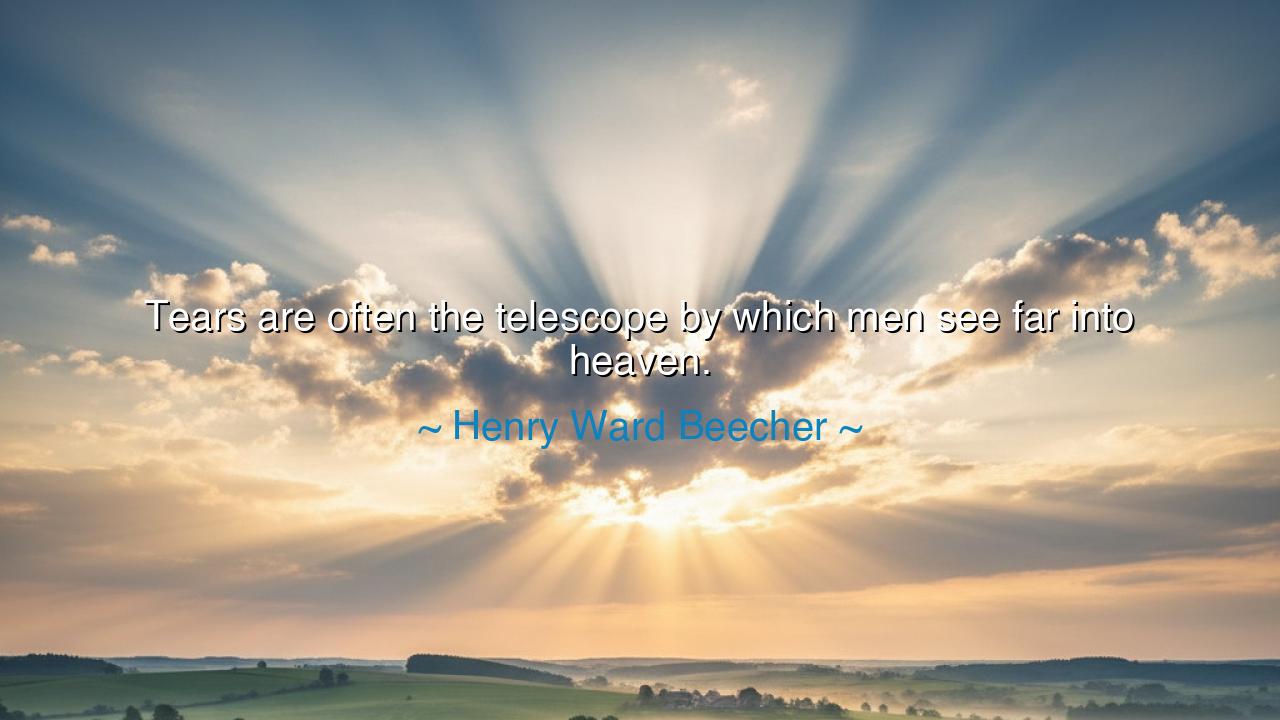
Tears are often the telescope by which men see far into heaven.






O children of the future, hear the words of Henry Ward Beecher, a man whose wisdom illuminates the depth of the human soul: "Tears are often the telescope by which men see far into heaven." These words carry a profound truth, for tears, though often seen as a sign of sorrow or weakness, are in fact a gateway to a higher understanding, a bridge that connects us to the divine. Beecher speaks of how in moments of profound grief, suffering, or joy, the heart is opened, and the soul is made receptive to the greater mysteries of life. Tears are not mere drops of water—they are the lens through which we glimpse the eternal, the divine, and the truths beyond our immediate understanding.
In the days of the ancients, it was often through great sorrow or sacrifice that the greatest insights were gained. The Greek tragedies, written by Sophocles and Euripides, show us that it is through the suffering of the hero that the greatest revelations are made. In the agony of Achilles, in the sorrow of Antigone, we find not just pain, but a wisdom that transcends the moment of grief. It is the deep emotions that open the heart to the understanding of life’s greatest truths, and it is through the tears of the soul that the stars of heaven are revealed. Beecher's words echo this ancient understanding—that tears are a path to enlightenment, a tool for seeing the divine in the most human of experiences.
Consider the story of Jesus Christ, who, upon hearing of the death of his friend Lazarus, wept. His tears were not of weakness, but of a deep compassion for the suffering of the world. In those moments of grief, Jesus revealed the depths of his connection to humanity, showing that sorrow can bring us closer to the divine, that in the tears of the heart, we find the compassion and love that bind us to heaven. His tears were not only a reflection of his human pain but a telescope into the divine love and resurrection that await us all. In his tears, we see a glimpse of the divine purpose that transcends death and suffering.
The lesson here, O children, is that tears—those sacred rivers of the soul—are not just a response to pain but a doorway to deeper wisdom. In moments of sorrow, we are often forced to look beyond the earthly and into the spiritual. Our hearts, opened by grief, can see farther than they ever could in moments of joy or comfort. Beecher reminds us that the telescope of tears allows us to look into heaven, to see the truths of existence, to understand the eternal dance of life, death, and rebirth. When we cry, we are not just expressing our sorrow, but we are tapping into a greater, universal truth that connects us all to the divine.
Think of the story of Nelson Mandela, who spent 27 years in prison, enduring suffering that would break the spirit of most men. Yet, when he was finally released and rose to lead his people, he carried within him not the bitterness of resentment, but the wisdom born of his suffering. His tears were not signs of weakness, but of a deep compassion for the suffering of his people and the future of his nation. His tears gave him the vision to see beyond the wounds of the past and to build a future of peace and reconciliation. In this way, Mandela’s tears served as a telescope, enabling him to see beyond the earthly injustices of the past and toward a divine future of unity.
The message, O children, is that tears—though they may seem like moments of weakness—are in fact powerful instruments of growth and understanding. They allow us to see beyond the limits of the present and into a greater purpose. When we weep, we are not just expressing sorrow, but we are opening ourselves to greater wisdom. Let us not shy away from grief or suffering, but let us embrace it as a means of deepening our connection to the divine and to one another. Like the tears of Jesus, like the tears of Mandela, let our grief be a pathway to greater love, greater understanding, and a deeper connection to the heavens.
So, O children, take this lesson into your hearts: when sorrow comes, let it be a telescope through which you see the divine. Let your tears guide you to wisdom and compassion, for in your deepest moments of grief, you are closest to the eternal truths of the universe. Do not be afraid to weep, for in the act of weeping, you open your soul to the love and grace that bind the heavens to the earth. Through your tears, you may see farther than you have ever seen before, and in that vision, you will find peace.






AAdministratorAdministrator
Welcome, honored guests. Please leave a comment, we will respond soon